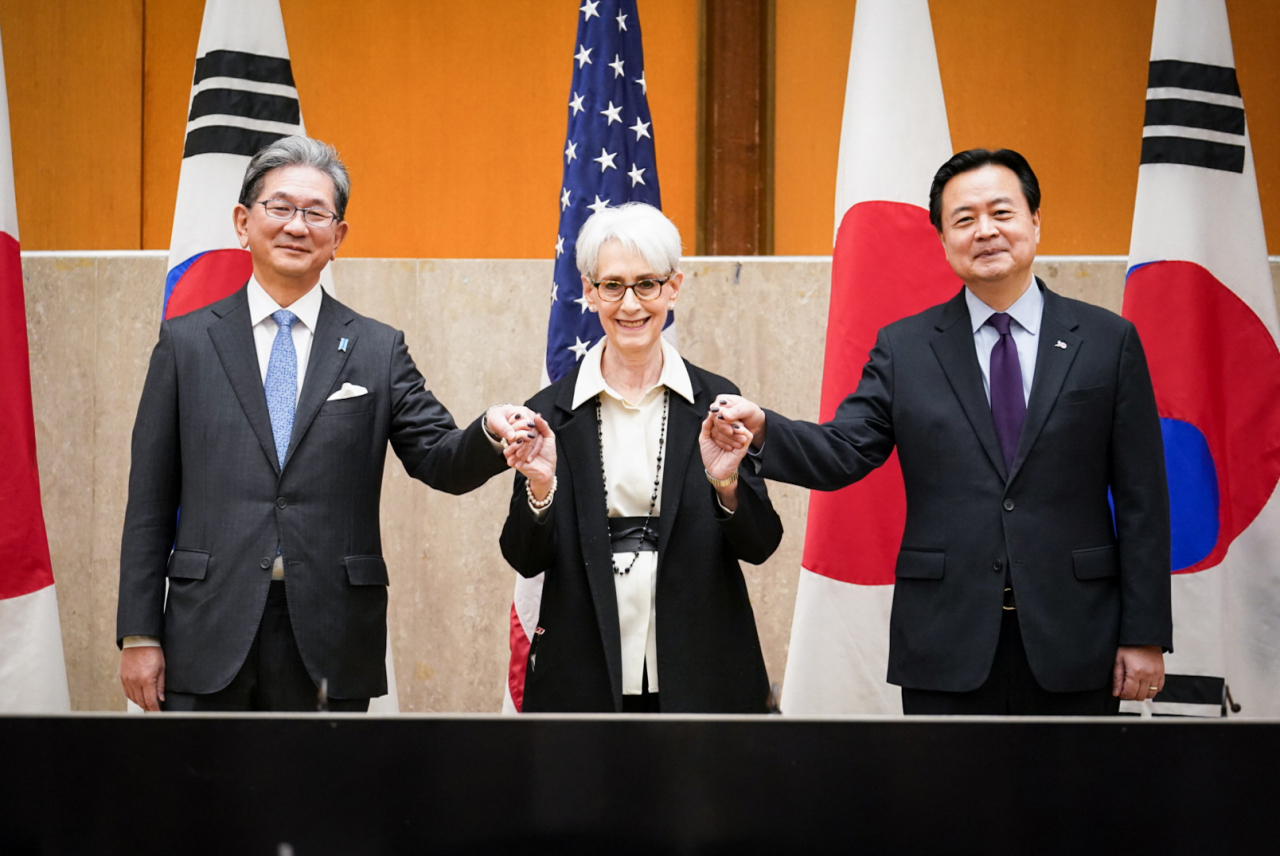 |
First Vice Foreign Minister Cho Hyun-dong (far right) and his US and Japanese counterparts at a meeting in Washington, the US on Monday. (Ministry of Foreign Affairs) |
First Vice Foreign Minister Cho Hyun-dong and his US and Japanese counterparts reaffirmed their commitment to denuclearizing North Korea while countering China to curb its “destabilizing activities” at a meeting in Washington on Monday.
The gathering, which last took place in October 2022 in Tokyo, chiefly addresses North Korea and China. Pyongyang fired off a record number of missiles last year and Beijing has recently been accused of sending what Washington says is a spy balloon over US airspace, though China claims it was meant for weather research. On Feb. 4, an F-22 fighter jet shot it down off the coast of South Carolina, the first of the four objects taken down by the US military. The other three officially remain unidentified.
“Standing united, our nations will deter the Democratic People’s Republic of Korea and urge it to give up its nuclear weapons program and abide by its obligations under UN Security Council resolutions,” Deputy Secretary of State Wendy Sherman said at a briefing, using North Korea’s official name.
Cho stressed urgency to put checks on the isolated country, saying any work deviating from shutting down its nuclear and missile programs that prompted international sanctions would yield no progress.
“Indeed, peace without denuclearization is fake peace,” Cho noted. His ministry said Tuesday efforts were still underway to hold North Korea accountable for its aggression in a United Nations Security Council presidential statement -- a push that is reportedly facing an impasse because of opposition.
In November last year, the US called on the 15-member UN body to endorse the move to curb the kind of missile launches Pyongyang had conducted early that month, when it tested another intercontinental ballistic missile that could reach the mainland US. China and Russia have repeatedly turned down international attempts to condemn such violence.
The Monday gathering also discussed a united front on China to maintain a rules-based international order, with Sherman rejecting China’s accusation that the US had also flown similar balloons to spy on China.
“As John Kirby, the National Security Council spokesperson, just said, there are no US government balloons over the People’s Republic of China -- none, zero, period,” she added, referring to China’s formal name.
Cho and his Japanese counterpart, Takeo Mori, echoed a similar sentiment, saying a violation of sovereignty requires a response. But Cho’s remarks were more nuanced than Mori’s. Rather then openly supporting the US takedown, the Korean diplomat highlighted “high-level dialogue” while speaking of countermeasures.
Following the three-way meeting, Cho and Mori discussed a compromise deal on offering restitution to Koreans forced to work for Japanese companies during World War II -- the single biggest issue that had plunged their ties to a fresh low.
The two neighbors are still working out last-minute details amid strong opposition from Korean victims who say their demands -- a direct apology and compensation -- are hardly reflected in negotiations. Seoul is leaning toward paying the victims itself as Tokyo is not agreeable to either conditions the victims seek.
“We need more discussion,” Cho told reporters after the meeting, saying the opportunity to do so could come as early as this Saturday during the Munich Security Conference, a three-day gathering of decision-makers on security policy that starts Friday. Foreign Minister Park Jin is expected to meet with his Japanese counterpart on the sidelines, though chances for tangible progress there look slim.







